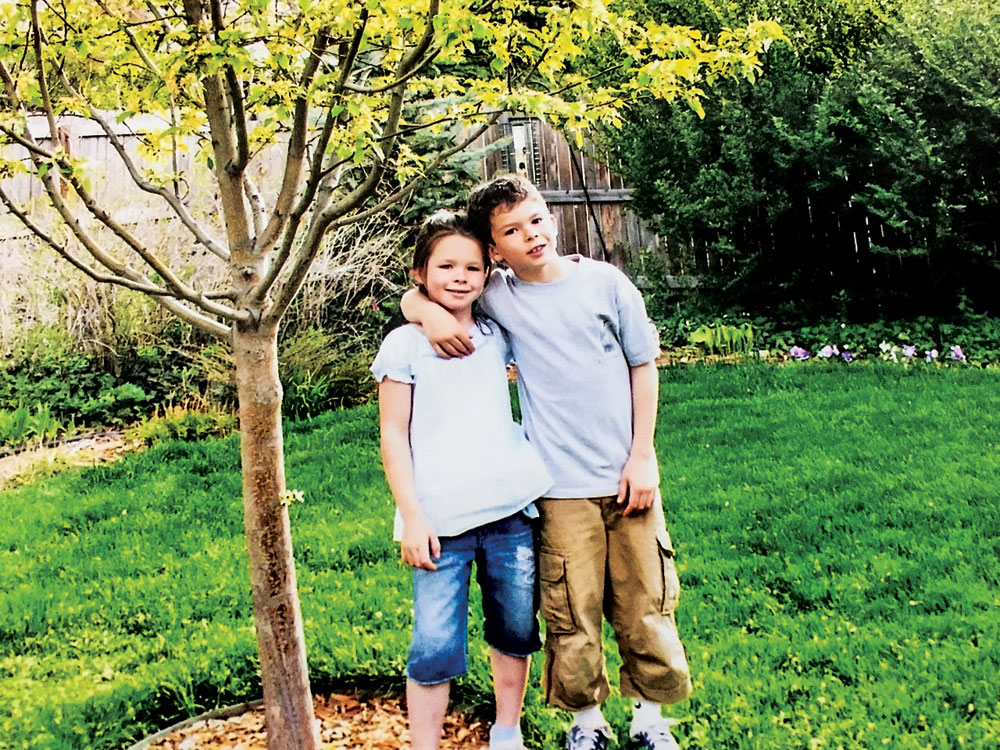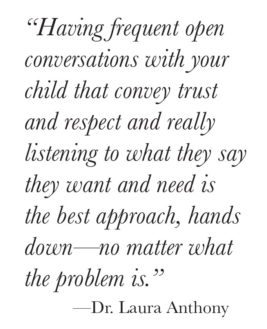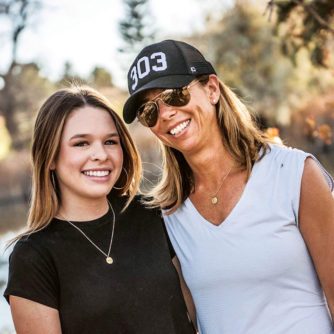
Bruno Anthony, PhD, Chief of Psychology and Laura Anthony, PhD, child psychologist, at the Pediatric Mental Health Institute, Children’s Hospital Colorado.
Editor’s Note: We chose Chloe’s story to highlight the importance of talking openly about feelings and mental health well before we knew how much COVID-19 would affect our community. As the impact of the virus settles into our lives and creates stress and anxiety for many, families may find this is a time they can nurture openness in their communication.
Talking about mental health issues is difficult for children and parents, but should not dissuade people from having these conversations, especially given the current challenges facing us all. “Having frequent open conversations with your child that convey trust and respect and really listening to what they say they want and need is the best approach hands down—no matter what the problem is,” says Park Hill resident Dr. Laura Anthony, a child psychologist in the Pediatric Mental Health Institute at Children’s Hospital Colorado.

Just a year apart in age, Chloe here stands with her brother, Ethan McNamee, in their grandparents’ backyard in 2005. Family photos courtesy of Chloe and her mom.
Chloe McNamee recalls her brother Ethan’s suicide when she was 12 as a turning point. “My mental health kind of deteriorated from there,” she says, “and I ended up in Children’s Hospital, in the inpatient unit a year later.” Tracy Edwards Konkol says her daughter had experienced “severe anxiety, paralyzing anxiety” as early as age 4, and agrees that Ethan’s death intensified Chloe’s struggles. In time, these manifested in depression, an eating disorder, and a suicide attempt.

Chloe (middle) is pictured with her stepfather, Steven Konkol and her stepsister, Allie Konkol, on a hike in South Park, CO with their dogs Finnegan and Bentley.
Chloe, who is now a college freshman at CU Boulder, is one face of many in a national pediatric mental health crisis. Colorado especially has been hit hard, with data showing increases in youth anxiety, depression and suicide. Though Chloe shared some of her feelings with friends, few could really relate to what she had experienced.
“You know, it’s interesting when somebody dies, there’s an outpouring of grief immediately and then, nine months or a year later nobody thinks about it anymore. I remember at the time Chloe felt very lonely,” says Konkol, who believes more supports are needed for youth and their parents. She cites the challenges of transitioning back to work after dealing with a crisis and finding a spot for behavioral health care for a child. Konkol is grateful for Children’s, and says she’s seen the hospital put in place greater supports for parents in recent years, but admits that even as an educated parent with resources, “I still don’t know what I’m doing, and I can’t imagine a family that has no resources…where you’re going to find a therapist, and you can’t pay for a therapist.”
 “You’ll often be surprised that kids are not all that opposed to talking with a counselor,” says Dr. Bruno Anthony, Chief of Psychology for the Pediatric Mental Health Institute. He recommends being very positive about these conversations and saying something to the effect of, “I think there are things you might be more comfortable talking with someone outside of the family about.” He also encourages parents to be vulnerable with their kids and share examples of times when they have not felt great, and “what they did to help themselves or what they wish they had done.”
“You’ll often be surprised that kids are not all that opposed to talking with a counselor,” says Dr. Bruno Anthony, Chief of Psychology for the Pediatric Mental Health Institute. He recommends being very positive about these conversations and saying something to the effect of, “I think there are things you might be more comfortable talking with someone outside of the family about.” He also encourages parents to be vulnerable with their kids and share examples of times when they have not felt great, and “what they did to help themselves or what they wish they had done.”
“Modeling for your kid or talking about family values” like wellness and asking for help is another approach, says Dr. Laura Anthony, who encourages families to combat stress, depression and anxiety with laughter and positive experiences. She adds that when it comes to talking about mental health, it’s important to be a “really empathetic listener….and allow them to sort of direct the conversation….That’s when you usually get the…most important kind of output.”

Now a freshman at CU Boulder, Chloe (pictured here during her senior year of high school in 2019) is studying psychology so she can make a difference in others’ lives.
Chloe did eventually share her feelings with someone other than her peers. “I was at Judy’s House [a nonprofit that specializes in bereavement work for families], doing my grief therapy and I opened up to this group counselor and she brought my parents in and was like, ‘She needs to go to the hospital.’” Being hospitalized, she says, is what allowed her to finally open up to her parents. “They were actually a lot more receptive to what I was saying than I had anticipated.” The path ahead was not clear and simple, but the support of her parents and her counselors allowed Chloe to address her struggles and move forward in a positive way.
“The mental health community has become more aware of asking the right questions around depression and anxiety and being able to identify it earlier and there are very successful treatments for anxiety and depression now,” says Dr. Bruno Anthony.
Despite all evidence to the contrary, many people still fear that talking about suicide will cause someone to act. Dr. Laura Anthony says this is simply not true. “You’re never putting the thought in their head.” In fact, talking about it may be positive in many ways. “We have many examples of people who are feeling suicidal and really desperate and one person reaching out with a kind gesture or checking in made them decide not to go through with it.”

Chloe says “the possibility of something getting better” impelled her to reach out for help. She is pictured here with her mother, Tracy Edwards Konkol.
“I know from personal experience being in a suicidal state,” says Chloe, “someone mentioning it to me and trying to talk with me about how I’m feeling and about suicide in general did not increase my likelihood at all of me wanting to act on any suicidal thoughts; in fact, I felt it was helpful because having that conversation makes you feel less alone. I think avoiding it is not helpful, it’s not the right thing to do. I think just talking about how you’re feeling is better than not saying anything at all,” says Chloe.
Recalling how her counselors who had gone through similar hardships were those she most connected to, Chloe is now pursuing a degree in psychology. She hopes her experience will someday allow her to help others navigating similar challenges. Both Chloe and the Anthonys point to higher levels of stress and social pressures as being fundamental to the rise in pediatric mental health issues.
It’s important that parents not fix children’s problems for them, says Dr. Laura Anthony. “That cuts off their ability to face and overcome challenges…That is a really important part of growing up—figuring out how to solve your own problems …which then makes you really much more resilient in the long run, and…is really positive against depression and anxiety.”



0 Comments